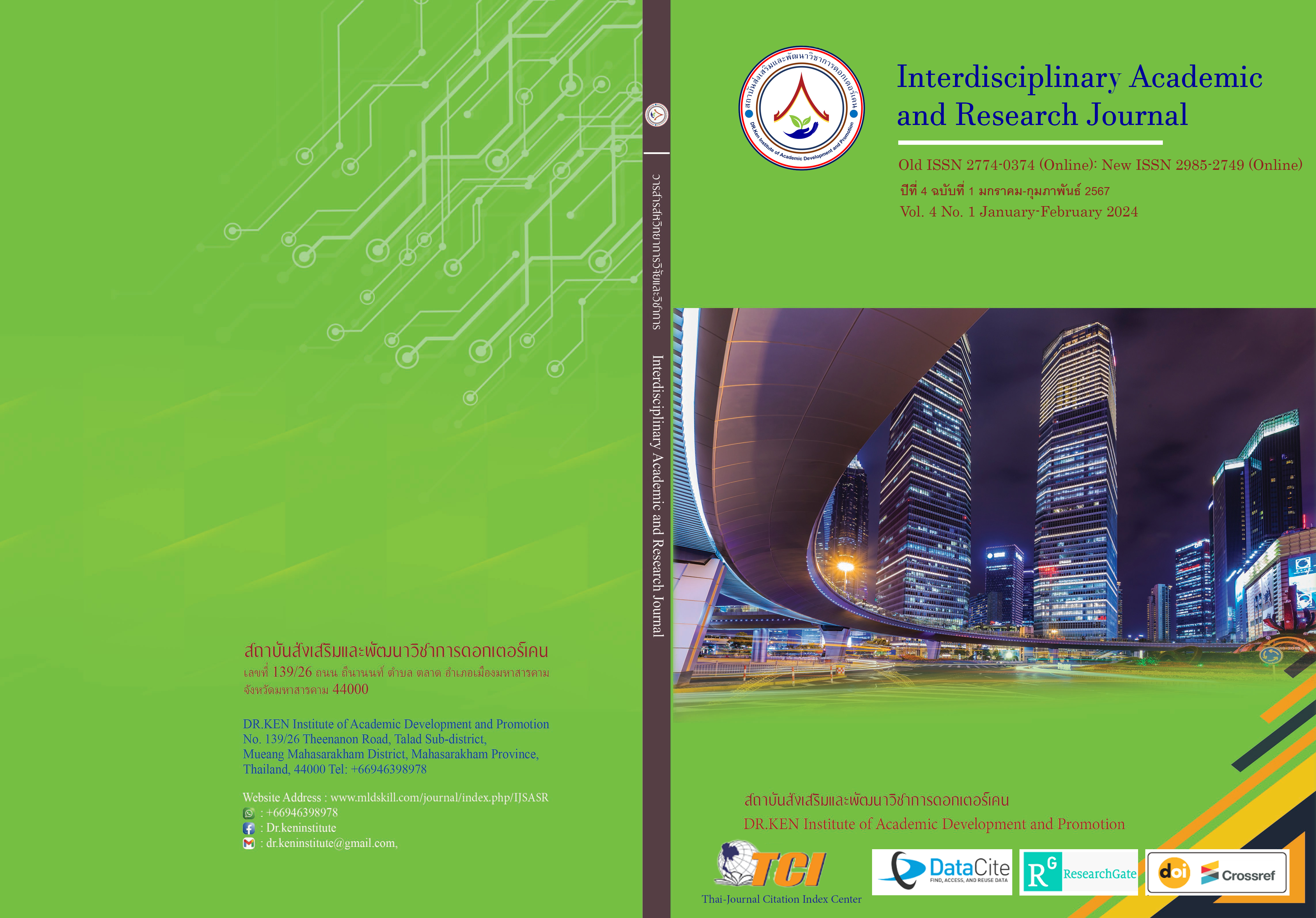The Development of Basic Mathematics Skills of Early Childhood Children by Organizing Learning Experiences According to the High Scope Concept
DOI:
https://doi.org/10.60027/iarj.2024.273462Keywords:
High Scope; , Basic Mathematics Skills; , Early ChildhoodAbstract
Background and Aims: Basic mathematical skills arise from experiences and learning that occur in a child's environment. They learn through observing, comparing, matching, categorizing, comparing, sorting, measuring, positioning, and counting. These are activities that children do in their daily lives, causing children to develop thoroughness in thinking and to use logical thinking and problem-solving. It is also an important basis for preparing to study mathematics at a more complex level. The objectives of this research were: 1) To investigate the basic mathematics skills of early childhood children who received learning experiences based on the High Scope concept. 2) To compare the basic mathematics skills of early childhood children before and after participating in learning experiences aligned with the High Scope concept.
Methodology: The target group under study comprises second-year early childhood students in semester 1 of the academic year 2023 at Khok Lamphan Witthaya School. The research tools included 10 learning experience plans based on the High Scope concept and a test designed to measure the basic mathematics skills of early childhood children. Data were analyzed using the arithmetic mean, standard deviation, percentage, and t-test.
Results: 1) The average scores of basic mathematics skills for early childhood children before organizing learning experiences according to the High Scope concept accounted for 34.20 percent. After organizing learning experiences based on the High Scope concept, this percentage increased significantly to 82.40%. 2) The basic mathematics skills of early childhood children improved after the learning experiences. This improvement was statistically significant at the .05 level.
Conclusion: The development of basic mathematics skills in early childhood significantly improved through the organization of learning experiences based on the High Scope concept, both as a whole and in each specific area.
References
กระทรวงศึกษาธิการ. (2560). หลักสูตรการศึกษาปฐมวัย. กรุงเทพฯ : โรงพิมพ์ชุมนุมสหกรณ์การเกษตรแห่งประเทศไทย.
กุลยา ตันติผลาชีวะ. (2551). การจัดกิจกรรมการเรียนรู้สำหรับเด็กปฐมวัย. กรุงเทพฯ : เบรน-เบสบุคส์.
ณัฎฐา มหาสุคนธ์. (2561). การจัดประสบการณ์ตามแนวคิดไฮสโคป เพื่อพัฒนาทักษะพื้นฐานทางคณิตศาสตร์ของนักเรียนอนุบาลชั้นปีที่ 1 มหาวิทยาลัยเทคโนโลยีราชมงคลธัญบุรี. คณะครุศาสตร์อุตสาหกรรม. สาขาวิชาการวิจัยและพัฒนาหลักสูตร
นิวัฒน์ สาระขันธ์ (2564). สอนอย่างไรให้นักเรียนเกิทักษะและกระบวนการทางคณิตศาสตร์, Joum Roi Kaensarn Academi. 6 (4), 202-218.
ผกาสินี ทวนทอง, สุนีรัตน์ แสงคุ้ม, & วไลพร เมฆไตรรัตน์. (2565). ผลการจัดประสบการณ์เกมการศึกษา โดยใช้ชุดกิจกรรมคณิตคิดสนุกที่มีต่อทักษะพื้นฐานทางคณิตศาสตร์ของเด็กปฐมวัย. วารสารวิชาการครุศาสตร์สวนสุนันทา, 6(2), 51-61.
วรนาท รักสกุลไทยและคณะ. (2554). สุดยอดเทคนิคการจัดการเรียนรู้แบบครูมืออาชีพ. กรุงเทพฯ : เพาเวอร์ พรินท์.
ศิราณี จันทร์บุตร. (2562). การพัฒนาทักษะทางคณิดศาสตร์ของเด็กปฐมวัยผ่านการเล่นโดยใช้ชุดสื่อกิจกรรม "คณิตคิดส์" (ปริญญาศึกษาศาสตร์บัณฑิต) สุพรรณบุรี มหาวิทยาลัยสวนดุสิต. สืบค้นจาก https:/wbscport.dusit.ac.th
สำนักงานคณะกรรมการการศึกษาขั้นพื้นฐาน. (2563). การกำหนดมาตรฐานการศึกษาของสถานศึกษา. กรุงเทพฯ : ห้างหุ้นส่วนจำกัด เอ็น.เอ.รัตนะเทรดดิ้ง.
อรัญญา บุญรักษ์, สุกานดา พันตาเอก, จำลองลักษณ์ เสียงสนั่น และสมใจ ภูครองทุ่ง (2566). ผลการใช้กิจกรรม เสริมประสบการณ์ตามแนวคิดไฮสโคปที่มีต่อทักษะพื้นฐานทางคณิตศาสตร์ ของนักเรียนชั้นอนุบาลปีที่ 3. Journal of Modern Learning Development, 8(5), 239-250.
อรุณี หรดาล. (2550). แนวการจัดประสบการณเพื่อพัฒนาเด็กปฐมวัยในประมวลสาระชุดวิชาการจัดประสบการณ์ สำหรับเด็กปฐมวัย. นนทบุรี: มหาวิทยาลัยสุโขทัยธรรมาธิราช.
Ministry of Education New Zealand. (2017). Decentralization in New Zealand. Retrieved October 10, 2017, from: https://www.edweek.org/ew/articles/2011/11/01/kappan evin.tm
Piaget, J. (1970). Science of Education and the Psychology of the Child. New York: Orion Press.
Piaget. J. (1962). The Original of Intelligence in Children. Trans, by Marget Cook. New York: International University Press.
Schweinhart, L.J., Barners, H.V., & Weikart, D.P. (2002). Significant benefits: the High Scope Perry preschool project study through age 27. Ypsilanti, MI: High Scope.
Downloads
Published
How to Cite
Issue
Section
License
Copyright (c) 2024 Natnicha Saoraksa

This work is licensed under a Creative Commons Attribution-NonCommercial-NoDerivatives 4.0 International License.
Copyright on any article in the Interdisciplinary Academic and Research Journal is retained by the author(s) under the under the Creative Commons Attribution-NonCommercial-NoDerivatives 4.0 International License. Permission to use text, content, images, etc. of publication. Any user to read, download, copy, distribute, print, search, or link to the full texts of articles, crawl them for indexing, pass them as data to software, or use them for any other lawful purpose. But do not use it for commercial use or with the intent to benefit any business.
















.png)


